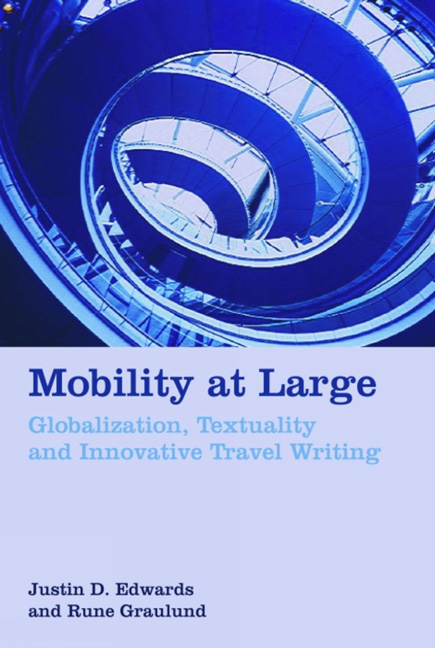Book contents
- Frontmatter
- Contents
- Acknowledgements
- Introduction: Travel Revisited
- 1 Travelling with the Ondaatje Bros.
- 2 Amitav Ghosh and Caryl Phillips: Global Travel, Then and Now
- 3 Unhomely Travels; or, the Haunts of Daphne Marlatt and W. G. Sebald
- 4 The World, My City: Home Grounds and Global Cities
- 5 Travel Histories – From Kuala Lumpur to Istanbul and Beyond
- Postscript: Still Mobile
- Bibliography
- Index
Introduction: Travel Revisited
- Frontmatter
- Contents
- Acknowledgements
- Introduction: Travel Revisited
- 1 Travelling with the Ondaatje Bros.
- 2 Amitav Ghosh and Caryl Phillips: Global Travel, Then and Now
- 3 Unhomely Travels; or, the Haunts of Daphne Marlatt and W. G. Sebald
- 4 The World, My City: Home Grounds and Global Cities
- 5 Travel Histories – From Kuala Lumpur to Istanbul and Beyond
- Postscript: Still Mobile
- Bibliography
- Index
Summary
Rent a Tourist
Hypothesis: Explore the working life of a city by renting yourself out to help with daily chores.
Apparatus: Paints or pens to make a sign, a sales pitch and a device to draw attention to yourself (eg Loudspeaker, red flashing light).
Method: Stand in the main square or plaza with a sign advertising yourself as a tourist ‘for rent’. If you have time, consider handing out a flyer that lists your possible duties. Avoid dark alleys, backstreets, etc
The Lonely Planet Guide to Experimental TravelIn 2005 Rachel Antony and Joël Henry published The Lonely Planet Guide to Experimental Travel, a book that built on Henry's playful Laboratory of Experimental Tourism, otherwise known as Latourex. Based on the notion of ‘travelling experiments’, the guide encourages us to move according to whims, chance, humour and serendipity. In Aerotourism, for instance, we are encouraged to visit an airport for 24 hours to enjoy the comfy chairs and a restaurant, but not board a plane. In Cecitourism, they explain, a tourist is blindfolded and led through a city escorted by a friend, thus circumventing the tourist gaze. And in Erotourism a couple travel separately to the same city and then try to find each other. These suggestions might, at first glance, seem like Lonely Planet's all-too-familiar discourse of antitourist tourism. But what is unique about Antony and Henry's experimental travel is the way it presents clear methods of travel while leaving the destination unknown. For this guidebook makes no reference to specific sites, places or attractions. Rather, it presents the act of travel as a game, even in some cases literally telling the reader to roll the dice to determine a destination (as in Trip Poker or Monopoly Travel). This guide, then, throws a monkey wrench into the cogs of the global consumer-based tourist industry by championing structured games and the shedding of our conventional conceptions of travel by concentrating on the evocative, often overlooked, aspects of everyday life: Alternating Travel is, quite simply, the act of leaving your front door, turning right, turning left at the next intersection, turning right at the next, and alternating each direction until you reach an obstruction.
- Type
- Chapter
- Information
- Mobility at LargeGlobalization, Textuality and Innovative Travel Writing, pp. 1 - 20Publisher: Liverpool University PressPrint publication year: 2012



